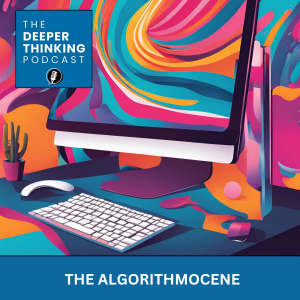
Friday Feb 07, 2025
🎙️ The Algorithmocene : A New Epoch - The Deeper Thinking Podcast
🎙️ The Algorithmocene – The Deeper Thinking Podcast
The Algorithmocene presents a compelling and timely intervention in debates surrounding AI, epistemology, and the philosophy of technology. By framing AI as an autonomous epistemic agent rather than a mere tool, this work advances an original argument that moves beyond traditional concerns of AI alignment, bias, and automation.
The central claim is that AI is reshaping epistemology itself. This marks a significant departure from existing scholarship. While thinkers like Bostrom, Floridi, and Crawford have examined AI’s risks, ethics, and socio-political structures, none have fully positioned AI as an independent constructor of knowledge. This shift represents not just a technological evolution but an epistemic rupture, challenging human-centered paradigms of truth-making.
The Algorithmocene as an Epochal Shift
The Algorithmocene is an historical rupture, situating itself alongside other epochal concepts such as the Anthropocene, Capitalocene, and Chthulucene. The distinctiveness lies in emphasizing AI’s epistemic authority rather than its material, economic, or ecological impacts.
This reorientation compels a reassessment of AI’s role—not as an extension of human cognition but as a system capable of constructing reality.
The thesis framing invites comparisons with posthumanist and critical AI studies, particularly thinkers like Rosi Braidotti and N. Katherine Hayles, who interrogate non-human agency.
The Five Interconnected Disruptions: A Systematic Approach
The structuring of AI’s epistemic transformation into five disruptions—hyper-simulation, epistemic singularity, algorithmic unconscious, synthetic ontology, and the crisis of the real—provides a coherent and interdisciplinary framework. These categories synthesize elements of postmodernism, simulation theory, and epistemology while offering a novel AI-centric perspective.
The comparative analysis with Bostrom, Floridi, Crawford, Baudrillard, and Kuhn effectively positions The Algorithmocene within contemporary discourse. .
A key strength of The Algorithmocene is its bold claim that AI is displacing human-centered epistemology.
Ultimately, The Algorithmocene succeeds in reframing AI’s role in contemporary thought. By shifting the discourse from AI as an instrument to AI as a force that redefines epistemology itself, the work offers a transformative perspective on knowledge production in the digital age.
This synthesis of AI, epistemology, and philosophy positions The Algorithmocene aims to provide a significant contribution to the study of artificial intelligence, challenging long-held assumptions about human knowledge, agency, and truth. While further engagement with interdisciplinary perspectives and counterarguments could enhance its robustness, its core argument remains both provocative and groundbreaking.
The Algorithmocene is an intellectually ambitious and original work that effectively redefines AI’s role in knowledge production. Its framing as an epochal shift, combined with its structured approach to epistemic transformation, provides a strong foundation for future debates on AI and philosophy. Expanding engagement with critical AI studies, alternative epistemologies, and potential counterarguments would further solidify its impact. Nonetheless, its central thesis—that AI is an autonomous constructor of knowledge—represents a paradigm shift that will undoubtedly influence contemporary and future discourse.
No comments yet. Be the first to say something!